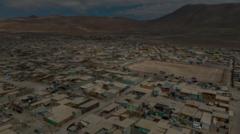Capturing water from fog on a grand scale presents a promising solution for some of the world’s driest cities, according to new research from Chile. The study focuses on Alto Hospicio, a desert city in northern Chile that receives less than 5mm of rainfall annually. Dr. Virginia Carter Gamberini, the lead researcher from Universidad Mayor, noted that the city struggles with severe social issues, including poverty and inadequate access to water. In slums without water delivery networks, residents rely on costly trucked supplies.
Unbeknownst to many, dense fog that frequently envelops the mountainous city could serve as a critical water source. Fog harvesting involves using fine mesh nets to capture moisture as it passes through the air. This simple yet effective method has been utilized in rural regions of South America for decades. A notable project exists in Morocco, demonstrating the technology’s effectiveness in arid environments.
Dr. Gamberini states that a "new era" of large-scale fog harvesting could bolster urban water supplies, particularly in pressing conditions. Her team's research assessed the potential of water collection from fog, correlating satellite imagery of cloud formations with weather patterns to discern the best areas for harvesting. Their findings reveal that the fog above the Pacific Ocean could become a sustainable drinking water source for the poor neighborhoods of Alto Hospicio.
The fog forms due to the interaction of warm, moist air with cold ocean waters, drifting over the coastal mountains. Researchers estimated that with 17,000 square meters of harvesting mesh, they could meet the weekly demand for water in urban slums, currently dependent on deliveries. Additionally, 110 square meters of mesh could cover the irrigation needs for local green spaces, further advocating for the idea of "water from the clouds."
The implications of this research are significant, especially as cities on the edge of deserts face rising demands from expanding populations and industries reliant on drying aquifers. Dr. Gamberini emphasized Chile’s unique geographic advantage with continuous ocean access and mountain ranges, leading her team to create a "fog harvesting map" for the nation.
She concluded that harvesting water from the clouds could enhance urban resilience to climate change and significantly improve access to clean water for vulnerable communities. The study highlights the pressing need to explore and leverage innovative water sources as populations and demands for fresh water increase.




















